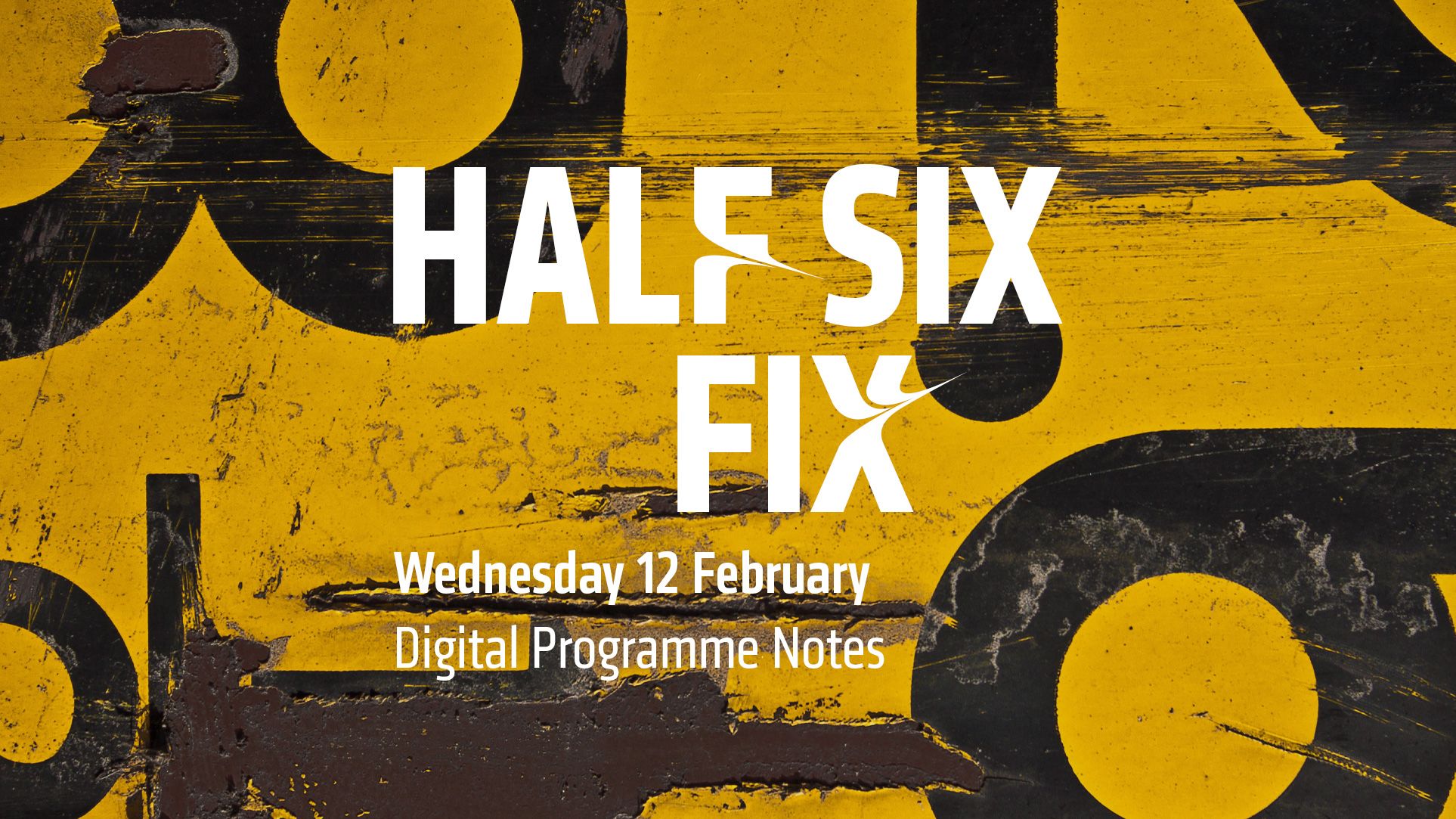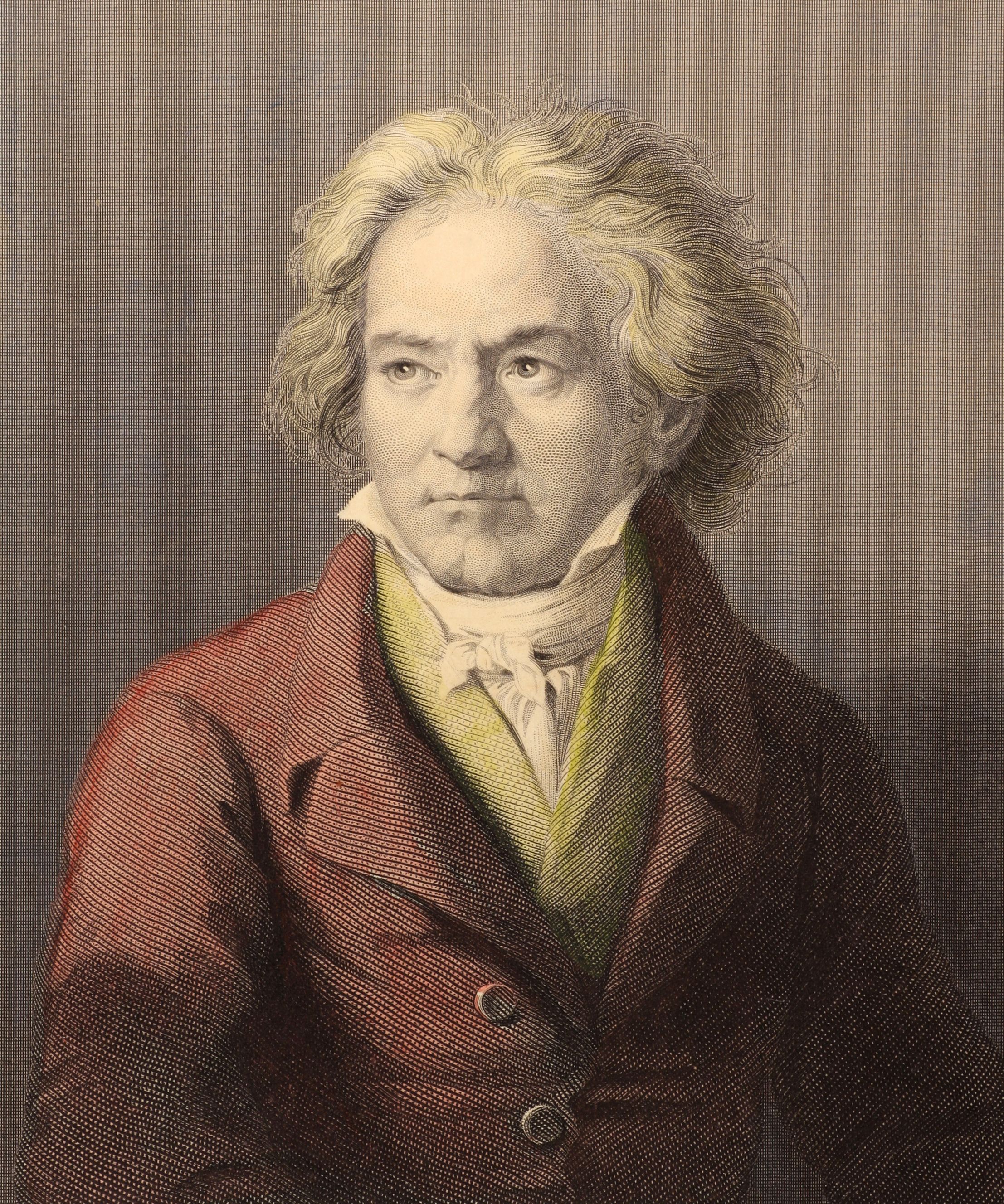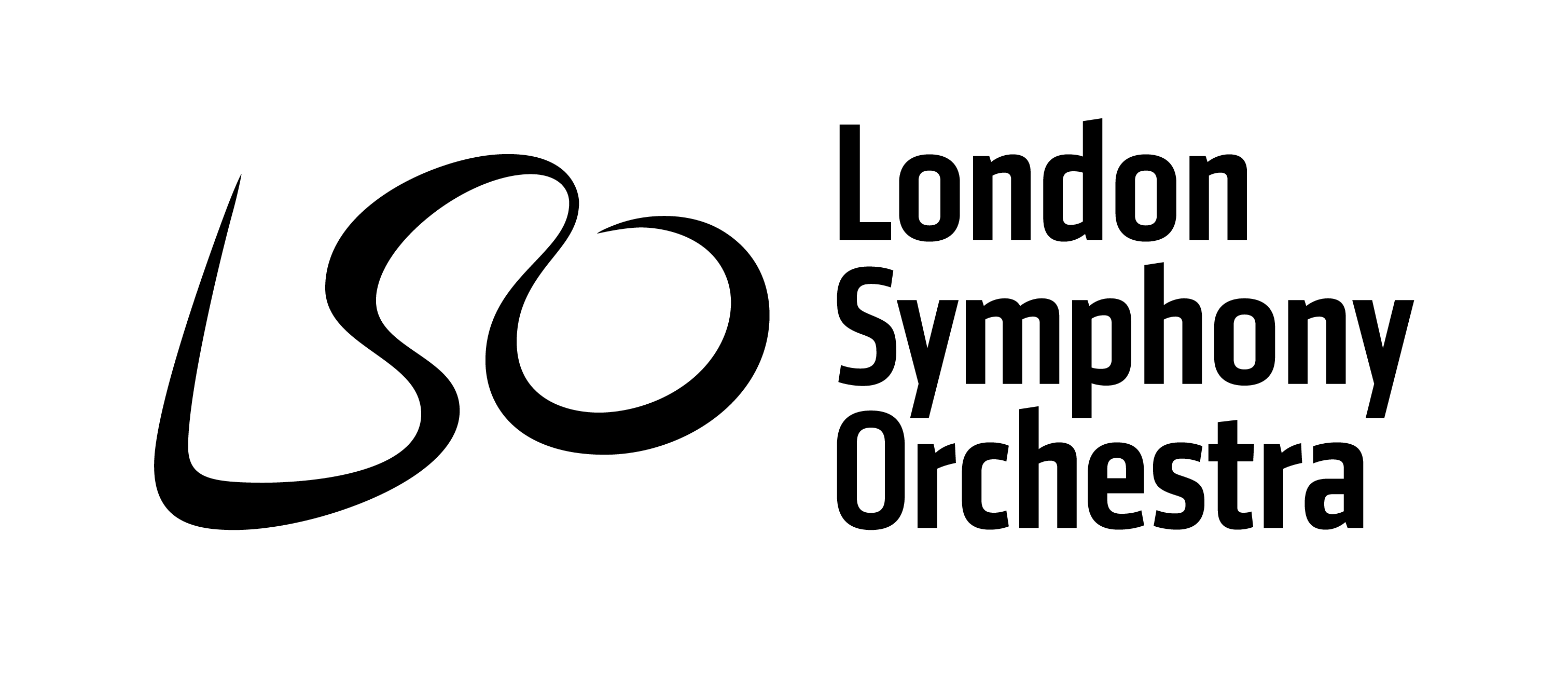
Welcome
Welcome to Half Six Fix, a different way to experience the London Symphony Orchestra. These concerts offer you a burst of music to kick off your evening. They're short and sweet, so the rest of the night is still yours.
You are invited to use your phone to scroll though these notes during the concert. You'll discover the story behind tonight's music as well as information about the Orchestra and tonight's artists.

Please Note: Photography, recording and filming are not permitted during the performance. To avoid distracting other audience members, we ask that you don't use other apps during the music.
You can navigate these notes using the menu icon in the top right of the screen.
There is a free WiFi network available, simply connect to 'LSO Half Six Fix'. No password is required.

Tonight's programme
Wednesday 12 February
6.30pm
Beethoven Symphony No 9, 'Choral'
Sir Simon Rattle conductor
Iwona Sobotka soprano
Anna Stéphany mezzo-soprano
Robert Murray tenor
Florian Boesch baritone
London Symphony Chorus
Simon Halsey chorus director
London Symphony Orchestra
Part of Beethoven 250 at the Barbican

'There is no other symphony I know of that starts from such enormous, crushing weight and gets lighter and lighter. And in fact the last movement is like Mozart … It’s full of a real joy and wit and intelligence.'
Sir Simon Rattle

Beethoven, Symphony No 9 in D minor, Op. 125 ‘Choral’ (1823–4)
1. Allegro ma non troppo, un poco maestoso
2. Molto vivace – Presto
3. Adagio molto cantabile – Andante moderato
4. Presto – Allegro ma non troppo – Vivace – Adagio cantabile
Almost 200 years after its first performance, Beethoven’s Ninth Symphony remains one of the most radical statements in classical music. The symphonic arena in Beethoven’s time was no place for voices, but four soloists and a choir gatecrash the symphony’s finale to sing the message of Friedrich Schiller’s poem ‘Ode to Joy’. By the end, Joy is unbounded, ecstatic: a force that promises to join all humankind ‘in one embrace’.
But the Ninth’s power doesn’t rest on its finale alone. The first movement opens in a formless void, pierced by thunderbolts that can belong only to the elemental force of Creation. The second movement has the light, playful elements of a traditional scherzo while in addition suggesting supernatural forces at play; it also features barking timpani. The third-movement Adagio brings a lyricism that looks forward to the Romanticism of Mahler.
Then comes the finale. It bursts in with a storm, out of which cellos and double basses desperately aspire to vocal expression. Snatches of themes from each of the three previous movements return, but they are rejected in favour of a new song. This is the unifying ‘Ode to Joy’ tune.
You’ll probably be humming it on your way home tonight.

Sir Simon Rattle on Beethoven Symphony No 9
'For any musician, when you do the Ninth … it changes you completely.
It demands so much of you … It’s like those great Van Gogh paintings in Amsterdam where the canvas isn’t enough and he paints on the frame. It’s as though Beethoven has gone entirely out of the frame.'
Image: Vincent van Gogh, Olive Trees in a Mountainous Landscape, June 1889

Ludwig van Beethoven (1770–1827)
In his early twenties Beethoven left his native Bonn for Vienna, where he became established as a composer, piano virtuoso and improviser of great ability. Largely following the Classical models of Haydn and Mozart in his ‘early’ period, he recognised signs of his impending deafness as early as 1796.
In 1802, he set out his suffering and alienation, his thoughts of suicide and his creative resolve in his Heiligenstadt Testament. His ‘middle’ period was characterised by a broadening of form and an extension of harmony to suit his proto-Romantic expression, spawning the Symphonies Nos 2 to 8, notable piano sonatas, several string quartets and his only opera, Fidelio.
He produced less music in his ‘late’ period (from 1813) but his last years saw his mould-breaking ‘Choral’ Symphony and an exploration of increasing profundity in the more intimate mediums of the string quartet and piano sonata.
Text and Translation
4 Finale
O Freunde, nicht diese Töne!
Sondern lasst uns angenehmere anstimmen
und freundenvollere!
O friends! Not these sounds!
But let us strike up more pleasant sounds
and more joyful!
Freude, schöner Götterfunken,
Tochter aus Elysium,
Wir betreten feuertrunken,
Himmlische dein Heiligtum.
Deine Zauber binden wieder,
Was die Mode streng geteilt;
Alle Menschen werden Brüder,
Wo dein sanfter Flügel weilt.
Joy, o wondrous spark divine,
Daughter of Elysium,
Drunk with fire now we enter,
Heavenly one, your holy shrine.
Your magic powers join again
What fashion strictly did divide;
Brotherhood unites all men
Where your gentle wings spread wide.
Wem der grosse Wurf gelungen,
Eines Freundes Freund zu sein,
Wer ein holdes Weib errungen,
Mische seine Jubel ein!
Ja – wer auch nur eine
Seele Sein nennt auf dem Erdenrund!
Und wer’s nie gekonnt, der stehle
Weinend sich aus diesem Bund!
The man who’s been so fortunate
To become the friend of a friend,
The man who has won a fair woman –
To the rejoicing let him add his voice.
The man who calls but a single soul
Somewhere in the world his own!
And he who never managed this –
Let him steal forth from our throng!
Freude trinken alle Wesen
An den Brüsten der Natur,
Alle Guten, alle Bösen
Folgen ihre Rosenspur.
Küsse gab sie uns und Reben,
Einen Freund, geprüft im Tod,
Wollust ward dem Wurm gegeben,
Und der Cherub steht vor Gott.
Joy is drunk by every creature
From Nature’s fair and charming breast;
Every being, good or evil,
Follows in her rosy steps.
Kisses she gave to us, and vines,
And one good friend, tried in death;
The serpent she endowed with base desire
And the cherub stands before God.
Froh, wie seine Sonnen fliegen
Durch das Himmels prächt’gen Plan,
Laufet, Brüder, eure Bahn,
Freudig wie ein Held zum Siegen.
Gladly as His suns do fly
Through the heavens’ splendid plan,
Run now, brothers, your own course,
Joyful like a conquering hero.
Seid umschlungen, Millionen!
Diesen Kuss der ganzen Welt!
Brüder – überm Sternenzelt
Muss ein lieber Vater wohnen.
Embrace each other now, you millions!
The kiss is for the whole wide world!
Brothers – over the starry firmament
A beloved Father must surely dwell.
Ihr stürzt nieder, Millionen?
Ahnest du den Schöpfer, Welt?
Such ihn überm Sternenzelt,
Über Sternen muss er wohnen.
Do you come crashing down, you millions?
Do you sense the Creator’s presence, world?
Seek Him above the starry firmament,
For above the stars he surely dwells.
Friedrich Schiller (1759–1805)
In 1809, Beethoven wrote that a great poem is more difficult to set to music than a merely good one because the composer must rise higher than the poet – 'who can do that in the case of Schiller? In this respect Goethe is much easier.' Beethoven should know – by 1809 he had set Schiller’s An die Freude (Ode to Joy) to music and written incidental music for Goethe’s play Egmont.
Johann Christoph Friedrich von Schiller was a German poet, philosopher, physician, historian and playwright. Both friend and collaborator with Goethe, together their works and ideas formed Weimar Classicism – a literary and cultural movement emphasising the value of humanism.
In the summer of 1785, Schiller wrote the first version of An die Freude but that text is not quite what you will hear tonight. Schiller himself went on to change it slightly, and Beethoven's didn’t stick entirely faithfully to the text of Schiller's poem, he introduces a few new sections.
There are relatively few musical settings of Schiller's poems, and Beethovens' is certainly the most famous. His work has been adapted by Johannes Brahms, Franz Schubert, Giuseppe Verdi, and more.
Image: Gerhard von Kügelgen, Portrait of Friedrich Schiller, 1808-1809

Beethoven and the Berlin Wall
In December 1989, to mark the fall of the Berlin Wall, Leonard Bernstein conducted Beethoven’s Ninth Symphony in Berlin, bringing together musicians from East and West Germany and from the four Allied powers. The British players were from the LSO, of which Bernstein was President. Capturing the spirit of the occasion, Bernstein changed the word Freude (‘joy’) to Freiheit (‘freedom’).
Image: My God, Help Me to Survive This Deadly Love, graffiti painting by Dmitri Vrubel on the eastern side Berlin wall.

Beethoven on-screen
What do Gary Oldman and Ed Harris have in common? Both have played the role of Beethoven on screen, Oldman in Immortal Beloved (1994) and Harris in Copying Beethoven (2006).
Thankfully the Beethoven franchise (1992–2008), featuring the loveable St Bernard named after the composer, didn’t make it to nine instalments (stopping just short at eight).

Listening to the audience
The story goes that at the first performance of Beethoven’s Ninth (probably after the second movement), the audience erupted with applause. Beethoven, who was standing next to the conductor, had his back to the audience and owing to his deafness had no idea. It was only when one of the soloists turned him around that he could see the audience reaction.

Tonight's Artists

Iwona Sobotka
soprano
Iwona Sobotka achieved international acclaim as the Grand Prize winner of the Queen Elisabeth International Music Competition in Belgium. Other awards include First Prize at the Warsaw Polish Art Song Competition and First Prize at the East & West Artists International Auditions in New York, that resulted in her debut concert in Carnegie Hall.
Highlights of her 2019/20 season include, among others, concerts with the Berlin Philharmonic under Sir Simon Rattle in Beethoven’s Christ on the Mount of Olives, the LSO at Festspiele Baden-Baden, the Orchestre Philharmonique de Luxembourg under Marek Janowski in Strauss’ Vier letzte Lieder, her debut at the Tokyo Spring Festival under Marek Janowski in Beethoven’s Missa Solemnis and at the Bayreuther Festspiele under Marek Janowski in Beethoven’s Ninth Symphony. She will perform as Pamina in world famous Barrie Kosky’s production of Mozart’s The Magic Flute with the Komische Oper Berlin on tour to Macao, Taiwan and Spain.
Following her graduation from the Fryderyk Chopin University of Music in Warsaw, Iwona continued her studies with the renowned artist and pedagogue Tom Krause at the Escuela Superior de Música Reina Sofía in Madrid.

Anna Stéphany
mezzo-soprano
Anglo-French mezzo-soprano Anna Stéphany studied at the Guildhall School of Music, where she was a recipient of the Gold Medal. She represented England at the BBC Cardiff Singer of the World and is a Kathleen Ferrier Award winner.
Anna was previously a member of the ensemble at Opernhaus Zürich, where she frequently returns as a guest artist. Further operatic appearances include Sesto (Mozart’s La Clemenza di Tito) and Sesto (Handel’s Giulio Cesare) at the Glyndebourne Festival, and Octavian (Strauss’ Der Rosenkavalier) at the Bolshoi in Moscow, the Royal Swedish Opera, Covent Garden and in Zürich.
In her 2019/20 season, Anna returns to Glyndebourne Festival as Ruggiero (Handel’s Alcina). On the concert platform performances include Mendelssohn’s Elijah with the Orchestra of the Age of Enlightenment conducted by Masaaki Suzuki, Mozart’s Requiem with Stiftung Mozarteum Salzburg and Elgar’s The Dream of Gerontius with the City of Birmingham Symphony Orchestra.

Robert Murray
tenor
Robert Murray studied at the Royal College of Music and National Opera Studio. He won second prize in the Kathleen Ferrier Awards 2003 and was a Jette Parker Young Artist at the Royal Opera House, Covent Garden.
He has sung for the Royal Opera House, English National Opera, Opera North, Garsington, Welsh National Opera, Norwegian Opera, Hamburg State Opera and Salzburg Festival; in concert and recital for Wigmore Hall, the Newbury, Two Moors, Brighton, Aldeburgh and Edinburgh festivals, LSO with Sir Simon Rattle, Simón Bolívar Symphony Orchestra with Gustavo Dudamel, Le Concert D’Astrée with Emmanuelle Haïm, City of Birmingham Symphony Orchestra with Sir Charles Mackerras, Rotterdam Philharmonic Orchestra with Yannick Nezet-Seguin, Philharmonia Orchestra with Esa-Pekka Salonen and the BBC Proms Orchestra with Sir John Eliot Gardiner.
Engagements for the 2019/20 season include returns to the Royal Opera House, Covent Garden, for Gerald Barry’s Alice, Britten’s Turn of the Screw at Wilton’s Music Hall and the title role in Mozart’s Mitridate for Garsington Opera; and concerts with the Bergen Philharmonic Orchestra and City of Birmingham Symphony Orchestra.

Florian Boesch
baritone
Austrian baritone Florian Boesch is one of today’s foremost Lieder interpreters with appearances at Wigmore Hall, Vienna’s Musikverein and Konzerthaus, Concertgebouw Amsterdam, Laeiszhalle Hamburg, Philharmonie Cologne, Edinburgh and Schwetzingen Festivals, Maifestspiele Wiesbaden, Konzerthaus Dortmund and Philharmonie Luxemburg as well as throughout the US (Carnegie Hall) and Canada. Florian Boesch was an artist in residence at the Wigmore Hall (2014/15) and at the Konzerthaus in Vienna (2016/17).
As a frequent concert guest, Florian Boesch has worked with leading orchestras and conductors such as the Vienna and Berlin Philharmonic, Royal Concertgebouw Orkest Amsterdam, Orchestre Philharmonique de Radio France, Gewandhausorchester Leipzig, Danish National Symphony Orchestra, Mozarteumorchester Salzburg, Bamberger Symphoniker, and Ivor Bolton, Gustavo Dudamel, Ádám Fischer, Iván Fischer, Valery Gergiev, Pablo Heras-Casado, Philippe Herreweghe, Sir Roger Norrington, Sir Simon Rattle, Robin Ticciati and Franz Welser-Möst. He worked very closely with Nikolaus Harnoncourt, with whom he performed many concerts at the Wiener Musikverein styriarte festival, Salzburg Festival, in Berlin and in Japan.
On the opera stage, Florian Boesch compels as a great singer-actor, most recently in a new production of Handel’s Orlando. He was also highly acclaimed for the title role in Berg’s Wozzeck and Handel’s Saul at the Theater an der Wien. Further successes in the past include Schubert’s Lazarus, Handel’s Messiah, Weill’s Die Dreigroschenoper as well as Méphistohélès in Berlioz’s La Damnation de Faust.
Florian Boesch received his initial vocal trainings from KS Ruthilde Boesch and later studied Lied and oratorio with KS Robert Holl in Vienna.

Sir Simon Rattle
conductor
Sir Simon Rattle was born in Liverpool and studied at the Royal Academy of Music. From 1980 to 1998, he was Principal Conductor and Artistic Adviser of the City of Birmingham Symphony Orchestra and was appointed Music Director in 1990. In 2002, he took up the position of Artistic Director and Chief Conductor of the Berlin Philharmonic where he remained until the end of the 2017/18 season. He became Music Director of the London Symphony Orchestra in September 2017.
Sir Simon regularly tours within Europe, North America and Asia, and has long- standing relationships with the world’s leading orchestras. Initially working closely with the Los Angeles Philharmonic and Boston Symphony Orchestras, Simon has also recently worked with the Philadelphia Orchestra and the Metropolitan Opera. Sir Simon is also a Principal Artist of the Orchestra of the Age of Enlightenment and Founding Patron of Birmingham Contemporary Music Group.
Sir Simon Rattle was knighted in 1994. In the New Year’s Honours of 2014 he received the Order of Merit from Her Majesty the Queen.

Simon Halsey
chorus director
Simon Halsey occupies a singular position in classical music. He is the trusted advisor on choral singing to the world’s greatest conductors, orchestras and choruses, and also an inspirational teacher and ambassador for choral singing to amateurs of every age, ability and background. Making singing a central part of the world-class institutions with which he is associated, he has been instrumental in changing the level of symphonic singing across Europe.
He holds positions across the UK and Europe as Choral Director of the London Symphony Orchestra and Chorus, Chorus Director of the City of Birmingham Symphony Orchestra Chorus, Artistic Director of Orfeó Català Choirs and Artistic Adviser of the Palau de la Música, Barcelona; Artistic Director of the Berlin Philharmonic Youth Choral Programme; Creative Director for Choral Music and Projects of WDR Rundfunkchor; Director of the BBC Proms Youth Choir, Artistic Advisor of the Schleswig-Holstein Musik Festival Choir; Conductor Laureate of the Rundfunkchor Berlin; and Professor and Director of Choral Activities at the University of Birmingham.
He is also a highly respected teacher and academic, nurturing the next generation of choral conductors on his post-graduate course in Birmingham and through masterclasses at Princeton, Yale and elsewhere.
Halsey has worked on nearly 80 recording projects, many of which have won major awards, including a Gramophone Award, Diapason d’Or, Echo Klassik, and three Grammy Awards with the Rundfunkchor Berlin. He was made Commander of the British Empire in 2015, was awarded The Queen’s Medal for Music in 2014, and received the Officer’s Cross of the Order of Merit of the Federal Republic of Germany in 2011 in recognition of his outstanding contribution to choral music in Germany.


The LSO was established in 1904 and has a unique ethos. As a musical collective, it is built on artistic ownership and partnership. With an inimitable signature sound, the LSO’s mission is to bring the greatest music to the greatest number of people.
The LSO has been the only Resident Orchestra at the Barbican Centre in the City of London since it opened in 1982, giving 70 symphonic concerts there every year. The Orchestra works with a family of artists that includes some of the world’s greatest conductors – Sir Simon Rattle as Music Director, Principal Guest Conductors Gianandrea Noseda and François-Xavier Roth, and Michael Tilson Thomas as Conductor Laureate.

Through LSO Discovery, it is a pioneer of music education, offering musical experiences to 60,000 people every year at its music education centre LSO St Luke’s on Old Street, across East London and further afield.
The LSO strives to embrace new digital technologies in order to broaden its reach, and with the formation of its own record label LSO Live in 1999 it pioneered a revolution in recording live orchestral music. With a discography spanning many genres and including some of the most iconic recordings ever made the LSO is now the most recorded and listened to orchestra in the world, regularly reaching over 3,500,000 people worldwide each month on Spotify and beyond. The Orchestra continues to innovate through partnerships with market-leading tech companies, as well as initiatives such as LSO Play. The LSO is a highly successful creative enterprise, with 80% of all funding self-generated.

London Symphony Chorus
The London Symphony Chorus was formed in 1966 to complement the work of the London Symphony Orchestra and is renowned internationally for its concerts and recordings with the Orchestra. Their partnership was strengthened in 2012 with the appointment of Simon Halsey as joint Chorus Director of the LSC and Choral Director for the LSO, and the Chorus now plays a major role in furthering the vision of LSO Sing, which also encompasses the LSO Community Choir, LSO Discovery Choirs for young people and Singing Days at LSO St Luke’s.
The LSC has worked with many leading international conductors and other major orchestras, including the Berlin Philharmonic, Vienna Philharmonic, Leipzig Gewandhaus, Los Angeles Philharmonic, New York Philharmonic, the National Youth Orchestra of Great Britain and the European Union Youth Orchestra. It has also toured extensively in Europe and has visited the US, Israel, Australia and south-east Asia.
The partnership between the LSC and LSO, particularly under Richard Hickox in the 1980s and 1990s, and later with Sir Colin Davis, led to its large catalogue of recordings, which have won numerous awards, including five Grammys. Gramophone included the recordings of Berlioz’s The Damnation of Faust and Romeo and Juliet on LSO Live with Sir Colin Davis as two of the ‘Top 10’ Berlioz recordings. Recent LSO Live recordings with the Chorus include Bernstein’s Wonderful Town and Berlioz’s The Damnation of Faust, both with Sir Simon Rattle.
The Chorus is an independent charity run by its members. It is committed to excellence, to the development of its members, to diversity and engaging in the musical life of London, to commissioning and performing new works, and to supporting the musicians of tomorrow. For more information, please visit lsc.org.uk.

Thank you for reading
We hope you enjoyed tonight's Half Six Fix. You can let us know what you thought by filling out this survey.
For more from the Orchestra, follow us on Instagram, Twitter and Facebook.
And of course, you can book your next Half Six Fix at lso.co.uk/fix.
#LSOHalfSixFix
Programme notes by Edward Bhesania
Edward Bhesania is a writer and editor who reviews for The Strad and The Stage. He has also written for The Observer, BBC Music Magazine, International Piano, The Tablet and Country Life.
Top Image: Scott Rodgerson Artist Images: Jim Rakete; Michal Heller; Marco Borggreve; Gerard Collett; Lukas Beck; Matthias Heyde

